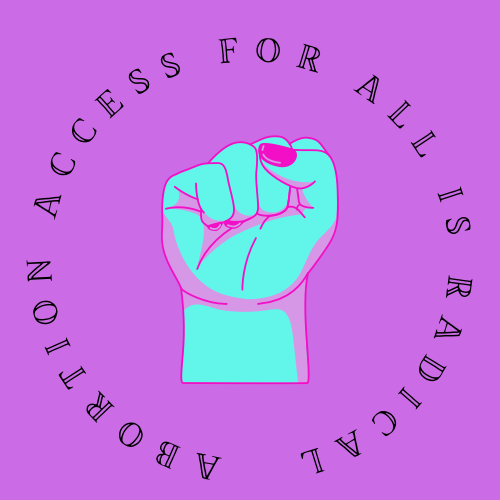Who’s Right Is It Anyway?: My Thoughts on Abortion Access and a world beyond Roe V. Wade

Posted by Larada Lee
January 28, 2021
As I sat and reflected on Roe V. Wade, on what happened to be the 48th anniversary of the landmark United States Supreme Court case, I realized that I am overcome with a sense of incompleteness. I thought of how legality renders itself useless when access is not at the forefront of abortion care as well.
Over the years, I have grown a massive disdain for the reproductive rights movement in the US for this specific reason. Aside from being primarily lead by and centering cisgender, heterosexual, middle-class white women (as if that’s not the sole deal breaker), there has been very minimal effort and progress in addressing all of the barriers to seeking an abortion. The distinctions couldn’t have made themselves more apparent as I scrolled down all of my social media feeds on January 22nd. Overall, a substantial portion of my following is pro-abortion so it goes without saying that my feed was flooded with posts commemorating the anniversary of Roe V. Wade. I find it telling that all of the poor Black, queer, trans, and folks on my feed highlighted that despite abortion being legal, access to abortion is not a reality for some folks while many white self proclaimed abortion advocates simply discussed keeping abortion legal whilst using gendered language.
I couldn’t help but think of all of the people who cannot afford to be solely concerned with abortion being legal. I thought of the people who lived in states like Texas or Alabama, where there are many restrictions put in place to discourage and deter those seeking abortion care. I thought of folks, like myself, who are Medicaid recipients and unable to pay for their abortions out of pocket. It is worth noting that abortion costs range between $300-$950 for pregnant people in their first trimester, the cost can be even more burdensome for those seeking abortions outside of that time. I thought of all of the trans and gender non-conforming folks who are not offered gender-affirming care and are left out of our conversations about abortion far too often. Minors who need judicial bypass, individuals who are in need of transportation to and from the 2-3 appointments required if you are not doing you’re abortion via telemedicine (only 13 states in the country offer the abortion pill via telemedicine). My own abortion experience, paired with learning the barriers faced by friends of mine has revealed to me over time the ever-present disparities in abortion access. It begs the question: Who’s right is it anyway?
The Hyde Amendment was first passed in 1977, 4 years after Roe v. Wade, and served as a direct attack on Roe v. Wade. When discussing his proposal, former Republican Illinois state rep. Henry Hyde stated: “I certainly would like to prevent, if I could legally, anybody having an abortion, a rich woman, a middle-class woman, or a poor woman. Unfortunately, the only vehicle available is the…Medicaid bill.” 45 years later, and The Hyde Amendment still serves as a systemic barrier to abortion that disproportionately affects poor people, and more specifically people of color. Many people are forced to carry their pregnancies to term because of this.
This is why it is time to reimagine Roe and examine these issues through a reproductive justice lens. It comes as no surprise that the term “reproductive justice” was coined by Black women in response to the isolation and limitations that existed within the white woman led reproductive rights movement. With the future of reproductive healthcare looking increasingly more grim, I encourage everyone to become more imaginative and envision a world beyond of Roe V. Wade. I hope to see conversations exceed past merely urging lawmakers and officials to “keep abortion legal” and venture more into conversations that emphasize the vitality of making abortion care accessible and affirming in the near future. Reproductive justice is radical and revolutionary in and of itself because it goes beyond rights and “inclusion” It seeks to center, uplift, and protect the most vulnerable and marginalized of us all. It addresses the intersections of race, class, sexuality, gender, etc. Abortion care is nothing without community, affirmation, and practical support.

Leave a Reply
You must be logged in to post a comment.

